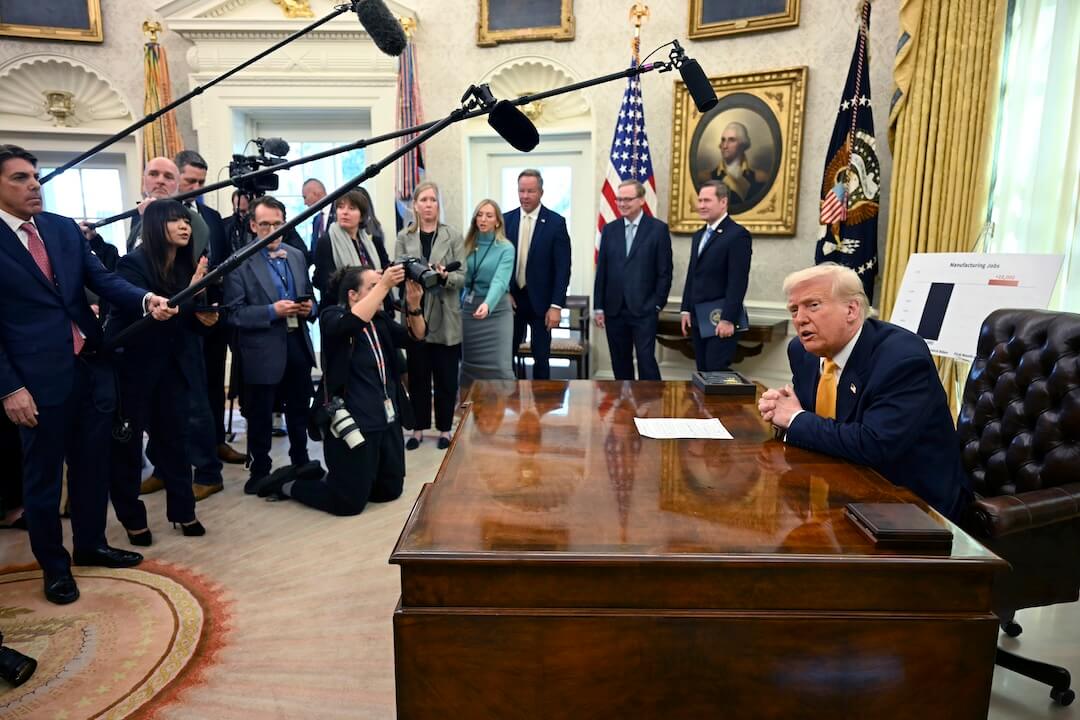Update, Wednesday, April 9, 2025: The White House filed a notice Wednesday that it is appealing the ruling to the U.S. Court of Appeals for the District of Columbia Circuit. The AP reported that two if its journalists were turned away from a presidential motorcade with the White House press pool Tuesday, shortly after the ruling.
A federal judge on Tuesday temporarily blocked the White House’s ban on The Associated Press, ordering the restoration of the outlet’s previous access to President Donald Trump.
The White House must rescind its “viewpoint-based denial” of the AP’s access to the Oval Office, Air Force One and other events and spaces that are open to journalists covering the White House, United States District Judge Trevor McFadden ordered. For the past two months, AP journalists have been barred from accessing certain White House spaces as punishment for the news agency’s refusal to call the Gulf of Mexico the “Gulf of America.”
“(U)nder the First Amendment, if the Government opens its doors to some journalists — be it to the Oval Office, the East Room, or elsewhere — it cannot then shut those doors to other journalists because of their viewpoints,” McFadden wrote in his order. “The Constitution requires no less.”
McFadden wrote that his order is based simply on the First Amendment, and it does not limit the “various permissible reasons” the government might have for excluding journalists from limited-access events.
“It does not mandate that all eligible journalists, or indeed any journalists at all, be given access to the President or nonpublic government spaces. It does not prohibit government officials from freely choosing which journalists to sit down with for interviews or which ones’ questions they answer.”
The order will take effect Sunday unless the White House chooses to appeal before then.
AP spokesperson Lauren Easton wrote in an emailed statement that the outlet is “gratified” by the ruling. “Today’s ruling affirms the fundamental right of the press and public to speak freely without government retaliation. This is a freedom guaranteed for all Americans in the U.S. Constitution.”
The White House started blocking AP reporters from presidential events on Feb. 11, when two AP journalists were turned away from two separate events. Three days later, White House deputy chief of staff Taylor Budowich posted on X that the AP was ignoring Trump’s executive order changing the name of the Gulf of Mexico to the Gulf of America.
“While their right to irresponsible and dishonest reporting is protected by the First Amendment, it does not ensure their privilege of unfettered access to limited spaces, like the Oval Office and Air Force One,” Budowich wrote.
The AP, which maintains a stylebook used by many American journalists, has said that as a global news agency, it must use names that are recognizable to all audiences. The Gulf of Mexico has had its name for more than 400 years, and many countries do not recognize Trump’s order, which only carries authority in the U.S, the AP said.
On Feb. 21, the AP sued Budowich, White House press secretary Karoline Leavitt and White House chief of staff Susan Wiles, arguing that the ban violated the First Amendment. Days later, the White House took over its press pool, kicking out the AP and adding journalists from conservative outlets like The Blaze and The Epoch Times to the rotation.
Unable to send reporters and photojournalists to White House events, the AP has lagged behind competitors in some of its reporting on Trump. The agency’s chief photographer in Washington, D.C., Evan Vucci, testified in court, “We’re basically dead in the water on major news stories.”
The ban has also hurt the AP’s ability to share its reporting with its clients, who have turned to other sources. To cover foreign leaders’ visits to the White House, the AP has had to spend money flying foreign-based journalists out as part of those leaders’ own press pools.








Comments